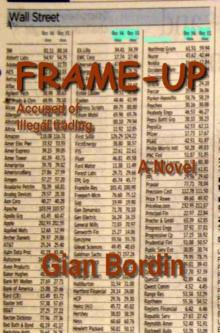- Home
- Gian Bordin
Frame-Up
Frame-Up Read online
Gian Bordin
FRAME-UP
Accused of insider trading
Copyright © Gian Bordin 2010
Thursday, 16th October, 11:05 a.m.
"Sheila, get your ass up to the boss right away." Edward Long is leaning his bulky torso into the partition between our cubicles, bending it precariously, a sneer on his face. As usual, his words are directed at my breasts.
My name is Cecilia, my mind replies silently, but I refuse to react and continue skimming through Hong-Kong’s Hang Seng closing stock exchange report.
"Did you hear me, sheila, or do you need it on paper?" The last word pronounced ‘piper’, his strong Aussie accent betraying his origin.
I’m sorely tempted to reply in kind, such as you bray loud and clear, but decide to ignore him, making sure my irritation doesn’t reach my face. Nothing irks him more than being ignored. For the hundredth time I question myself why I must share the office with this immature prick from down under. Just because he drives a Porsche Carrera doesn’t mean every woman wants to get into his pants.
"Blokes, you’re my witness," he shouts into the room. "I wash my hands. I’ve done my duty by the boss."
His swivel chair groans as he slumps down and disappears behind the partition. He badly needs to work out, more than just in his car. Except for his beer belly, he has the build of a rugby player, broad shoulders, a short thick neck, thighs like hams.
Two hours ago I read that devastating Reuters newsflash about Sanvino Ltd. on the news bar of one of my three computer screens that update share prices during trading hours of the London Stock Exchange. Ever since I’ve been waiting for the boss’s call. That ruinous newsflash announced that Sanvino has secured a highly lucrative three-year contract with Singapore Airlines. Their shares instantly rose a staggering 20 percent and caused trading to be temporarily suspended. It has just resumed a few minutes ago. And yesterday I acted on a rumor I thought to be reliable that Sanvino was going to lose the Lufthansa deal. I sold the 12 million shares held by one of my biggest clients, Ventura Consolidated, a possibly questionable Italian investment company. Entering such a large parcel for sale on the stock exchange risks a substantial drop in price, so I checked with a few stockbrokers I’ve had contacts before. I thought to be lucky when Bob Gough at Goldsax signaled he might have a buyer. The transaction was concluded two ticks below the previous day’s closing price — an excellent price under these circumstances, I thought at the time. But as it now turns out, I deprived my client of a two-million-pound capital gain. The worst nightmare for any stockbroker! Will Fred Garland pass the Ventura account to somebody else? To silly Edward Long, for instance? That one wouldn’t let a day pass without rubbing it in. It might take months, if not years for my hard-earned reputation as a savvy stockbroker to recover.
But the boss’s call can’t be ignored. Reluctantly, I rise, straighten my white blouse, slip on my regulation dark gray business jacket, briefly check my make-up in the round mirror on my desk, and then aim for the corridor at the far end of the brokers’ open-plan area, which gives access to the manager’s and seniors’ offices and the conference room.
"Ice queen, this time a pretty face won’t get you out of the hole you dug for yourself," Long sniggers, as I pass his cubicle. "You’ll have to offer him much, much more. You’re in deep shit, sheila, deep shit." The last is punctuated by a laugh that would do pride to a goat.
The temptation to take the opposite direction, scurry past the reception and lift lobby and out of the building is overpowering. I force myself to push open the glass door into the corridor leading the Garland’s office. In front of his door I pause for a few seconds, filling my lungs deeply several times — a conscious effort to compose myself — and then knock firmly.
"Entrez!" Fred Garland loves to show off his meager knowledge of French.
I enter. "Sir, you called me."
"Ah, Cécille." French again. He points to a chair, while rising at the same time, and then walks around his desk, where he eases himself against it, towering over me — a deliberately dominating position. "I guess you know what this is all about." He locks eyes with me questioningly.
"The Sanvino transaction."
"Yes. I’m at a loss to understand how you could get it so utterly wrong. Selling Ventura’s holdings at a loss when everybody expected that Sanvino was on the verge of securing another lucrative deal. I’m deeply disappointed in you. How could you? Ventura lost at least three million pounds."
"To put the record straight, they got about a million more than what they paid for the shares when they acquired them on my recommendation a year ago." I perceive that Garland is ready to interrupt. "But I agree that they lost out on a potential capital gain of about two million."
"Still —"
Again I hurry on: "Sir, I thought I acted on reliable intelligence that Sanvino was going to lose the Lufthansa contract. I even checked it out with a friend at Goldsax who confirmed that they had heard something to this effect just the other day. So I didn’t give Ventura the advice to sell without good reasons."
"Do I understand that Ventura gave you a specific order to sell?"
"Yes, Signor Carvaggio did after I advised him to sell."
"He gave it in writing?"
"No, verbally only."
"I see …" He frowns, his gaze straying to the window before returning to me. "This Mr. Carvaggio, what’s he like?"
"You mean as a person? … He is quite abrupt. So far, most of his buy or sell orders have come over the phone, but he usually accepts my recommendations when I make him aware of promising opportunities."
"Yes, you have done well by Ventura. Just out of curiosity, where did your intelligence come from?"
"Edward Long, sir." Why did I give credence to anything that guy says? I lament to myself.
"Long? I thought you two were not on speaking terms."
"We may not be the best of friends, but we are colleagues and do occasionally work together," adding silently: reluctantly, on my part. "Besides, he quite often seems the first to be privy to market intelligence." Again, I don’t voice: some of which is insider information that he uses for trading on his own account — strictly illegal, and that’s how he funds his extravagant lifestyle. "But, as I said, I checked it out —"
"Why go to your boyfriend?"
How does he know I checked with Gary, I wonder?
"Why didn’t you come to me, especially for a sizable transaction like this?" he continues when I don’t respond immediately.
Because last time I did you told me in no uncertain terms to do my own research, but I’m not going to remind you of this either. "Edward Long suggested I check it out with Goldsax."
"You did." He again looks out the window, frowning.
So far, things have gone better than I’ve feared. Nevertheless I wonder whether he is going to take the Ventura account away from me. It would be a severe blow, as well as cause a drastic cut in my commission and bonuses.
"It’s a rather unfortunate affair. Let’s hope this Carvaggio never finds out what happened to Sanvino. And take this as a lesson to make absolutely sure your intelligence is sound."
"Thank you, sir." He lets me keep Ventura. I almost vent my relief with a deep sigh. The threatened storm has spared me. "Is there anything else, sir?"
He dismisses me with the customary wave of his right hand.
As I return to my desk, I can feel the eyes of all eight colleagues firmly burn into my back. I make sure my expression reveals nothing. Long is the only one who can’t resist a quip. "Very cool, ice queen. My deepest respect. Even under fire you live up to your frigid image. And did he tell you who’s going to get Ventura?"
"No, but he was keen to know who passed me that bum intelligence about Sanvino."
&nb
sp; "And you told him? How very unsportsmanlike of you."
Thursday, 6:50 p.m.
The sense of relief, bordering on optimism that my position at Lewis Stockbrokers is not irredeemably jeopardized, evaporates when I spot Carlo, my brother five years my junior, sitting on the entrance steps to the apartment building in Queensway where I live a few steps from the Bayswater underground station. His appearance invariably means trouble. Charming, good-looking, unless he suffers from withdrawal, he only shows up when he needs money for drugs or a bed to recover. Each time he usually manages to score a few hundred quids off me, and each time I also tell him that this is the last time. Obviously, he never takes me by my word, and experience proves him right. He always has a hard luck story — being robbed at the gym (I doubt he has ever set foot in one), having lost his job (the eighth this year alone), the landlady threatening to throw him out (isn’t he mostly freeloading with somebody?), his girlfriend walking out on him (they all do or, more accurately, they kick him out), an urgent trip back to Switzerland to see our mother (probably a trip to Amsterdam where the drugs are cheaper), needing a laptop as a condition for enrolling in a computer course (he has tried that one before), forgetting his bag in the underground (the only one I can halfway believe). And each time, I have to make a conscious effort not to let myself be swayed by his endearingly innocent mien.
I’ve always felt responsible for him even before our father traded our mother in for what I then suspected was a younger model and walked out on us. Carlo was only a vulnerable ten-year-old. My father was and still is a partner in a London law firm, and we grew up in Chelsea. My Swiss-Italian mother was chronically homesick for Montagnola, the quaint village near Lugano she grew up in. So I was more mother to Carlo than she was. And after the divorce, she simply couldn’t cope without a husband in a country that had a remained foreign land to her even after sixteen years of marriage. To survive, she took refuge in her parents’ home in Montagnola. She remained depressed for most of Carlo’s teen years. I managed to steer him out of trouble until his last year at highschool. By then I had graduated with a degree in computer science from the Università della Swizzera Italiana in Lugano and shortly afterward returned to London, when my father offered to finance me to do an MBA at the London Business School. After I left, Carlo quickly got into trouble. The university study allowance he received from our father after completing highschool, he spent on drugs. Claiming to be enrolled at the University of Zurich, he lived in the easy drug culture of that city. By the time my father caught on to his subterfuge and cut him off, my brother had moved to the even livelier scene of Amsterdam.
So what might Carlo want from me this time? Has he already gone through the two hundred pounds I gave him on Wednesday last week, although I recall that he then looked in better shape than during the last nine months? There’s my Aikido practice at eight, and I don’t want to leave him alone in the apartment. Last time I did, he walked off with one of my valuable antique prints. Nor do I want another unpleasant confrontation between him and Gary, my stockbroker boyfriend, who I hope will join me later for the night.
Carlo’s face lights up when he sees me. He gets up and gives me a hug. "I thought you’d never come home," he murmurs. "I was getting hungry." He must have gleaned something in my expression and begs: "You won’t turn me away, not your little brother." One of those disarming smiles plays around his eyes. As usual, we converse in the local dialect of the Ticino, one of the Italian-speaking parts of Switzerland.
"I think that I’ll be able to cook up some food, but I don’t have much time. It’s Aikido night." As I open the door to the apartment, I notice that he has no luggage. I don’t know whether this is a bad or a good sign, but it probably means he does not intend to overnight at my place.
"Oh, I don’t mind spending the evening alone. I haven’t watched TV for ages."
"No, Carlo. I don’t want to leave you alone here —"
"Don’t worry, Ceci," he interrupts with a chuckle, using my nickname, pronounced ‘chechi’, meaning chickpeas, "I won’t nick anything. I still have most of what you gave me last week." He saw right through my reason for not wanting him alone in the apartment. "Let’s get some food on the table. I’m starving."
He goes straight to the kitchen and opens the refrigerator.
"There’s a lasagna casserole," I call out, as I deposit my handbag safely in the cupboard of my bedroom, kick off my shoes and then quickly change into casual trainers and a loose top. By the time I return to the kitchen, the casserole is already in the microwave, and he is setting plates, glasses, cutlery and napkins on the table. At least in this respect, I’ve trained him well.
"Any wine?" he questions, while opening the food cupboard and bending down to the wine rack where I store the reds. He inspects several and then settles on a Beaujolais. Taking two glasses from the shelf, he asks: "And how are things at the office? Made a big killing this week?"
I give him a succinct rundown on the Sanvino affair. He listens with his usual inattentiveness. While I talk, I prepare a salad dressing, Italian style — balsamic vinegar, mustard, pepper, an organic condiment instead of salt, a few chopped-up leaves of basil, and olive oil — and then empty about half a bag of a pre-washed lettuce and rocket mixture into the bowl. By that time, the casserole is hot.
"But they can’t hold that against you. You did what you judged was the best action," he comments, as he places the casserole on the table.
"It’s not that simple. First, my reputation is in tatters, and if the client puts the heat on the firm, the boss might still sacrifice me. But tell me, why you are here, since you say you still have most of the dough I gave you last week?"
"Do you have such a low opinion of me? Can’t I even make a brotherly visit to my favorite sister without raising suspicion? Besides, there is always something decent to eat in this joint," he replies with his endearing smile.
"Talking about sisters, you still haven’t met Susan and Clara, have you?" They are our half-sisters from our father’s second marriage.
"No. Why should I? As you well know, the old man told me to go to hell."
"He was angry and disappointed. He didn’t mean it."
Carlo shrugs his shoulders. "I don’t need him either."
"But they are your sisters."
"Ceci, just leave it." His face has turned somber.
For a while, we eat in silence. He digs into the food as if he hasn’t eaten for days. In contrast to other drug addicts I’ve come across, he always maintains a healthy appetite even while under the influence, which probably is his salvation from going under completely.
"Beside the food, what’s your reason for this visit?"
"I just wanted to let you know that I’ll be gone for a while."
"And your job?"
"Didn’t work out."
"Why?" I know it’s useless to even ask.
"That Croat boss was a really bad number."
"Where will you go?"
"Mama has begged me to spend some time with her. I haven’t seen her for almost half a year. And then I might do some traveling."
"But hardly on the two hundred I gave you."
"Oh no. I finally got all my back pay and I also scored me some lucky money on the side. Enough for a couple of months if I’m careful."
I find it difficult to believe what I hear. Carlo careful with money? He takes greater care with his drugs. Maybe that’s how he scored. "You didn’t deal, did you? You promised me never to do it again. I don’t want to have to visit you in jail’
"Don’t worry, Ceci. It was all legitimate. Just this guy who wanted me to do him a small favor."
How can I believe him? However, I decide to let it go. I don’t really want to know. It would only make me even more anxious about him. If he’s off to Montagnola, he will be off my back for a while, and right now with the Sanvino affair still lurking in the background I welcome that.
Carlo actually hugs me good-bye after finishing off the casserole and most
of the wine. I’ve hardly eaten any, but I make it to Aikido in time.
Friday, 17th October, 10:40 a.m.
A call on the internal office phone.
"Miss Walker, come to my office." It’s Garland. Addressing me by my last name doesn’t sound promising, nor does the lack of ‘please’. What now?
"Right away, sir," I reply, but he has already hung up.
Again, I compose myself for a couple of seconds before knocking on his door. This time he calls out "enter" — not French, another bad sign.
As last time, he waves me into a chair and walks around the desk. "To come right to the point, Miss Walker, I’ve received a highly abusive call from this Carvaggio of Ventura."
As if I didn’t know the man’s affiliation.
"He accuses us of incompetence, or worse, of deliberately having cost him two million pounds."
Yes, Carvaggio would talk as if it were his own money. It’s more likely to be laundered Mafia funds. I brace myself to lose the Ventura account.
"He demands that we compensate him for the loss. He also demands that I assign him to another broker."
So the axe has fallen. "Sir, he agreed to the sale," I barge in. "He cannot hold us liable."
"It’s not that simple, young woman. He claims that your advice was a deliberate ploy to make him agree to the sale, and that you must have known the real situation. To put it bluntly, he is convinced that you arranged for another broker to buy the shares and then sell them again after the Sanvino announcement on the Singapore Airlines deal."
"But that’s outrageous! I would never do anything of the sort. Not only is it unethical, but it’s also illegal. If it’s discovered, it would lead to my immediate and permanent ban as a broker, as well as a lengthy jail term."
"That may be so, but let me ask you frankly, and I expect a truthful answer. I may still manage to limit the damage. Did you or didn’t you do what he accuses you of?" He is towering threateningly over me, his eyes boring into mine.

 Chiara – Revenge and Triumph
Chiara – Revenge and Triumph Kidnapped and a Daring Escape
Kidnapped and a Daring Escape Yuen-Mong's Revenge
Yuen-Mong's Revenge Frame-Up
Frame-Up Summer of Love
Summer of Love